中考英语专项复习课件 第07讲 连词
图片预览
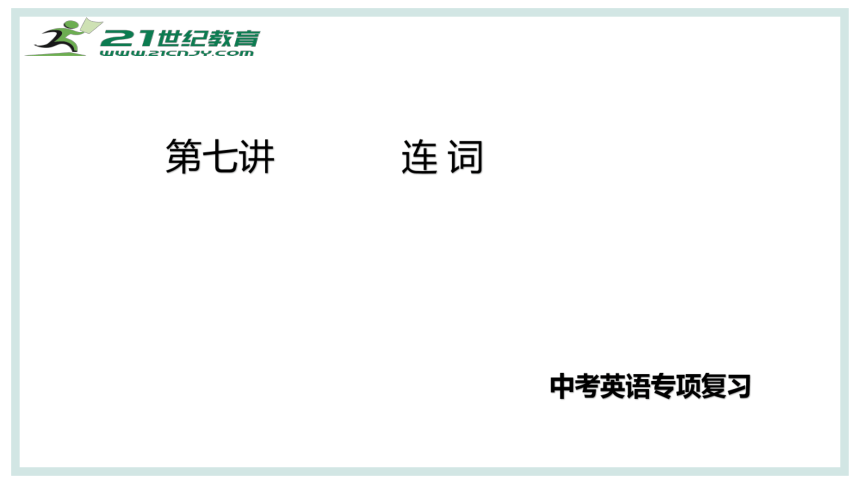
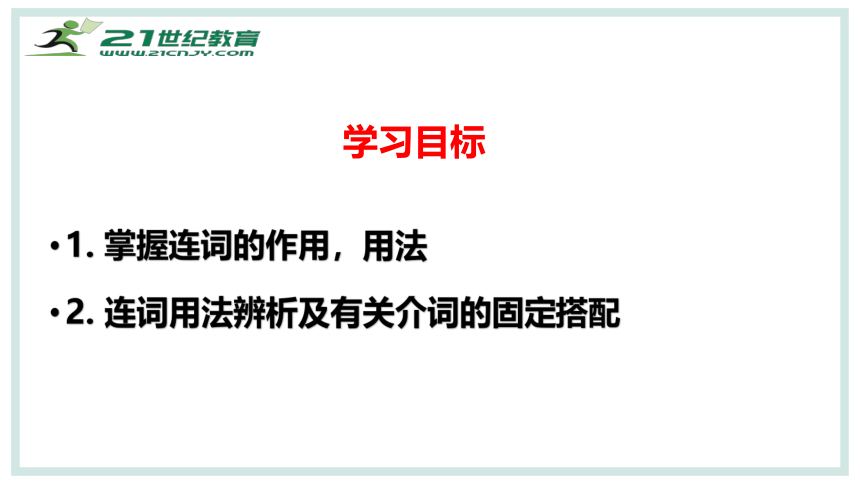
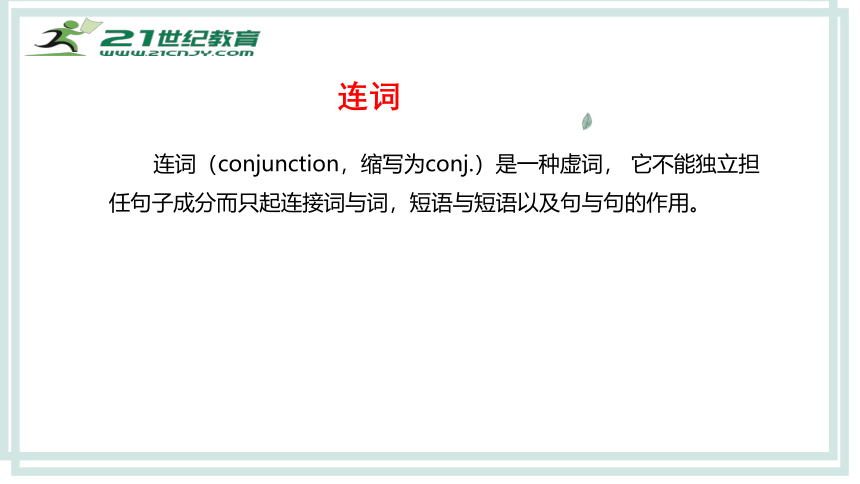

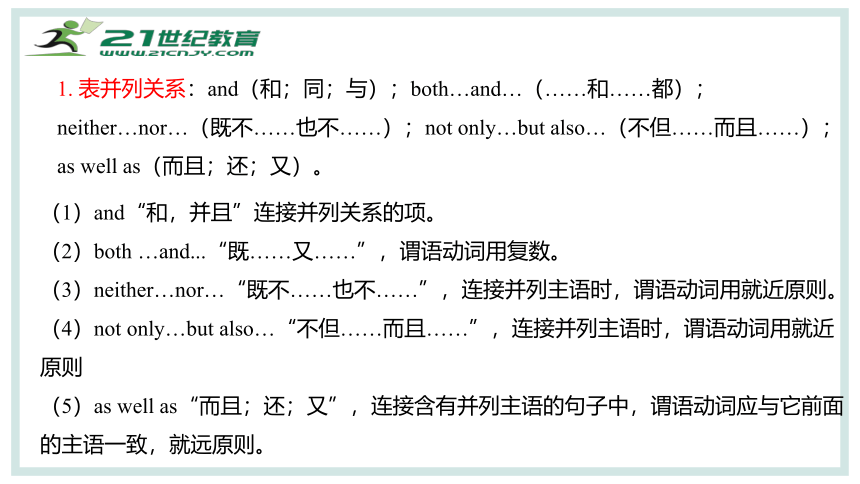
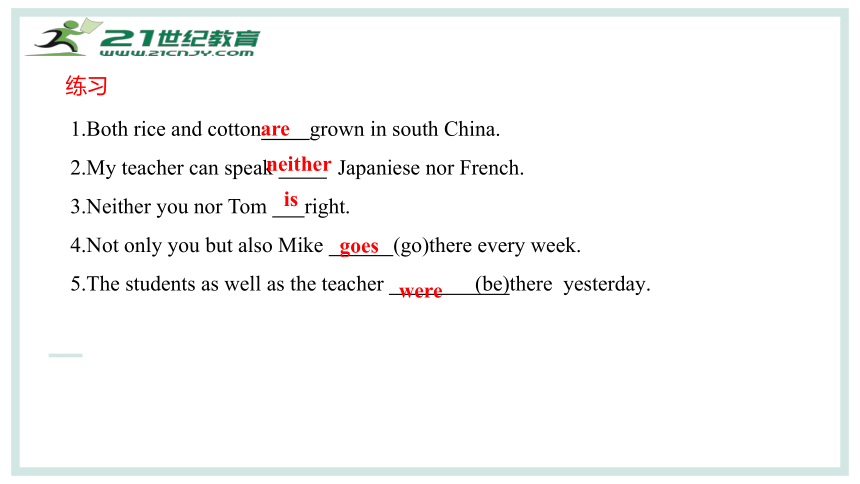
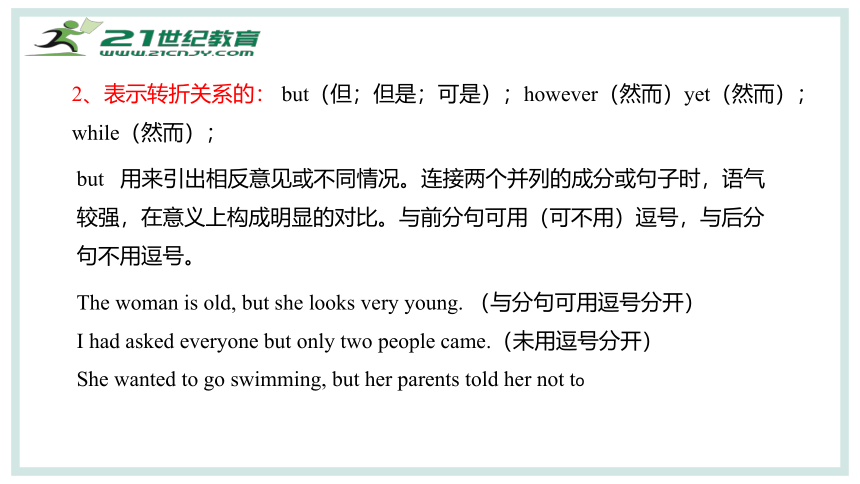
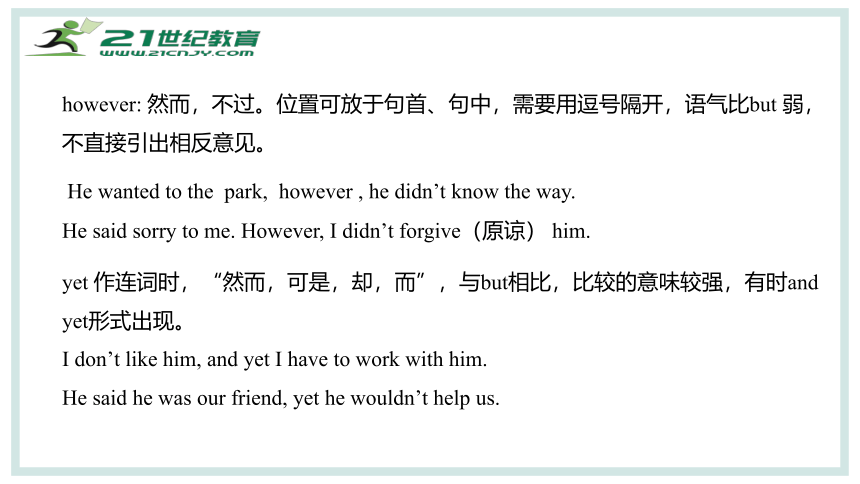
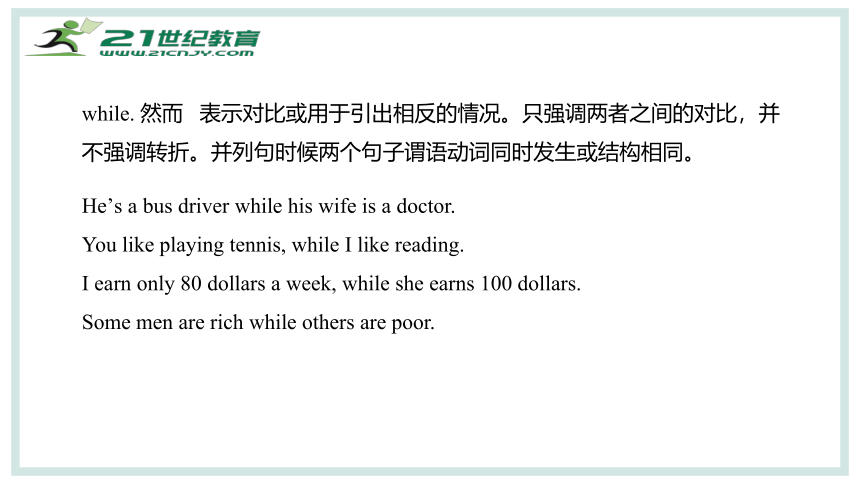
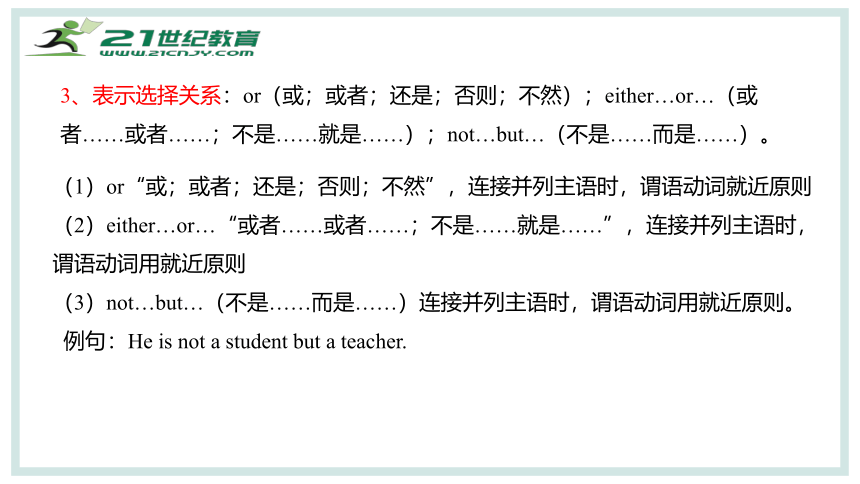
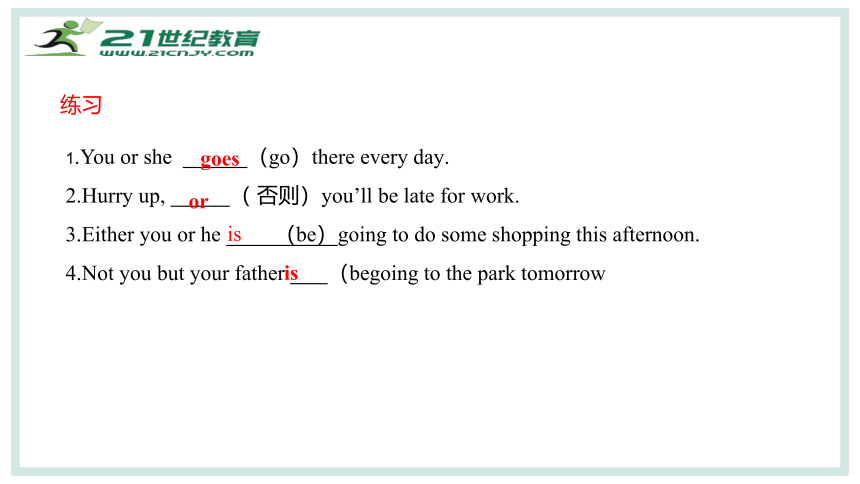
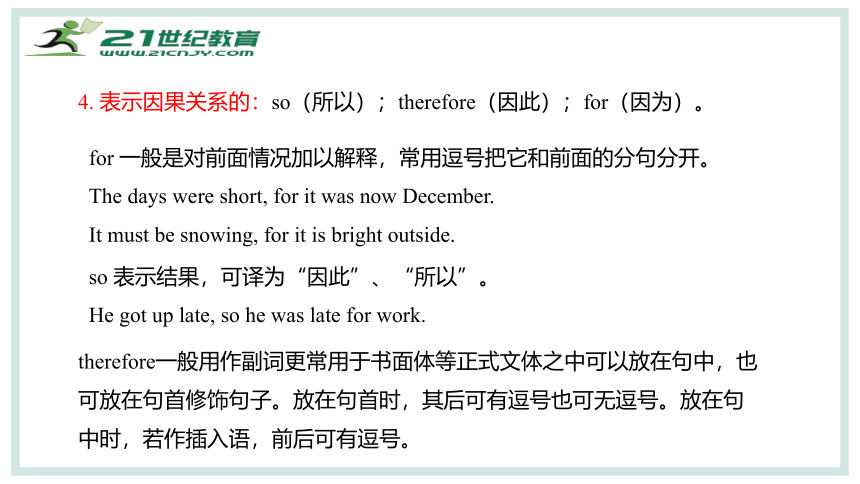
文档简介
(共35张PPT)
第七讲 连 词
中考英语专项复习
1. 掌握连词的作用,用法
2. 连词用法辨析及有关介词的固定搭配
学习目标
连词
连词(conjunction,缩写为conj.)是一种虚词, 它不能独立担任句子成分而只起连接词与词,短语与短语以及句与句的作用。
一 并列连词的基本用法
并列连词是用来连接语法地位相同的单词、短语以及句子的连词。
并列连词或词组主要分为表示并列关系、转折关系、因果关系及选择关系。
1. 表并列关系:and(和;同;与);both…and…(……和……都);neither…nor…(既不……也不……);not only…but also…(不但……而且……);as well as(而且;还;又)。
(1)and“和,并且”连接并列关系的项。
(2)both …and...“既……又……”,谓语动词用复数。
(3)neither…nor…“既不……也不……”,连接并列主语时,谓语动词用就近原则。
(4)not only…but also…“不但……而且……”,连接并列主语时,谓语动词用就近原则
(5)as well as“而且;还;又”,连接含有并列主语的句子中,谓语动词应与它前面的主语一致,就远原则。
文本信息
标题数字等都可以通过点击和重新输入进行更改。文字数字大小颜色参考此模板
1.Both rice and cotton grown in south China.
2.My teacher can speak Japaniese nor French.
3.Neither you nor Tom right.
4.Not only you but also Mike (go)there every week.
5.The students as well as the teacher (be)there yesterday.
练习
are
neither
is
goes
were
2、表示转折关系的: but(但;但是;可是);however(然而)yet(然而);
while(然而);
but 用来引出相反意见或不同情况。连接两个并列的成分或句子时,语气较强,在意义上构成明显的对比。与前分句可用(可不用)逗号,与后分句不用逗号。
The woman is old, but she looks very young. (与分句可用逗号分开)
I had asked everyone but only two people came.(未用逗号分开)
She wanted to go swimming, but her parents told her not to
however: 然而,不过。位置可放于句首、句中,需要用逗号隔开,语气比but 弱,不直接引出相反意见。
He wanted to the park, however , he didn’t know the way.
He said sorry to me. However, I didn’t forgive(原谅) him.
yet 作连词时,“然而,可是,却,而”,与but相比,比较的意味较强,有时and yet形式出现。
I don’t like him, and yet I have to work with him.
He said he was our friend, yet he wouldn’t help us.
while. 然而 表示对比或用于引出相反的情况。只强调两者之间的对比,并不强调转折。并列句时候两个句子谓语动词同时发生或结构相同。
He’s a bus driver while his wife is a doctor.
You like playing tennis, while I like reading.
I earn only 80 dollars a week, while she earns 100 dollars.
Some men are rich while others are poor.
3、表示选择关系:or(或;或者;还是;否则;不然);either…or…(或者……或者……;不是……就是……);not…but…(不是……而是……)。
(1)or“或;或者;还是;否则;不然”,连接并列主语时,谓语动词就近原则
(2)either…or…“或者……或者……;不是……就是……”,连接并列主语时,谓语动词用就近原则
(3)not…but…(不是……而是……)连接并列主语时,谓语动词用就近原则。
例句:He is not a student but a teacher.
1.You or she (go)there every day.
2.Hurry up, ( 否则)you’ll be late for work.
3.Either you or he (be)going to do some shopping this afternoon.
4.Not you but your father (begoing to the park tomorrow
练习
goes
or
is
is
输入标题文本信息
标题数字等都可以通过点击和重新输入进行更改。文字数字大小颜色参考此模板
4. 表示因果关系的:so(所以);therefore(因此);for(因为)。
for 一般是对前面情况加以解释,常用逗号把它和前面的分句分开。
The days were short, for it was now December.
It must be snowing, for it is bright outside.
so 表示结果,可译为“因此”、“所以”。
He got up late, so he was late for work.
therefore一般用作副词更常用于书面体等正式文体之中可以放在句中,也可放在句首修饰句子。放在句首时,其后可有逗号也可无逗号。放在句中时,若作插入语,前后可有逗号。
输入文本信息
点击此处输入文本信息。标题数字等都可以通过点击和重新输入进行更改,菜单设置中功能区可以对字体、字号、颜色、行距等进行修改。文字数字大小颜色参考此模板
二 常用从属连词的基本用法
引导状语从句的连词如下:(状语从句的知识点会在专门后面的章节详细讲解)
(1) 引导时间状语从句的连词:when, while, as, before, after, until, till, as soon as, since等。
时间状语从句和主句的时态关系为:主将从现,主过从过。
① when 意为“当……时”。
② while 意为“正当……时,正在……时”。
在while引导的从句中,谓语动词必须是延续性动词,且常用进行时;
as 意为“正当……时”, as引导的从句中,谓语动词既可用延续性动词,也可用短暂性动词。
③ before 意为“在……之前”;after 意为“在……之后”。
④ until 意为“直到……为止”。如:
⑤ as soon as 意为“一……就……”。
⑥ since 意为“自从”。
1.He was doing his homework when the telephone rang. 电话铃响的时候,他正在做作业。
2.She fell asleep while/as she was watching TV. 他看着电视睡着了。
3.As Mary sat down on the sofa, Mike came into the room. 玛丽坐在沙发上时,麦克走进了房间。
4.I’ll wait for you here before you come back.
5.The children didn’t go to bed until their mother came back.
6.I’ll call you as soon as I get home.
7.I have lived in Pari since I came to France.
(2).引导条件状语从句的连词有:if, unless等。一般来说条件状语从句的主句与从句的时态要前后一致。但条件状语从句也像时间状语从句一样,如果主句谓语动词用一般将来时,从句谓语动词常用一般现在时表示将来时间。
We’ll be late unless we hurry up. 除非快点儿,否则我们会迟到。
If it is fine tomorrow, we’ll go fishing. 如果明天天气好,我们去钓鱼。
(3)引导目的状语从句的连词有:so that(是为了;以便于);in order that(以便于)等
Tom got up early so that/in order that he could catch the early bus.
(4)引导原因状语从句的连词有:because, as, since等。
【注意】在英语中because与so不能同时出现在一个句子中。
He didn’t go to shool because he was sick.
(5)引导结果状语从句的连词有:so…that,such…that等。
so…that和 such…that 意思均为“如此……以至于……”,
so后面+形容词或副词, that后接从句
such后面+名词或名词性短语,that后接从句。
He was so tired(形容词) that he couldn’t go any further. 累得走不动了。
She is such a clever girl(名词性短语) that everyone likes her.
同义句:She is so clever a girl that everyone likes her.
点击此处
输入文本信息
(6)引导让步状语从句的连词:though, although, even if(=even though)等。
【注意】在英语中,though和although不与but连用。
Though he did not have much money, he was still happy.
Even though he‘s 24 now, he still like a little child.
(7)引导比较状语从句的连词有:than, as…as…等。
He is better at Chinese than I.
I think English is as important as Chinese.
三 常用连词用法辨析
1. while, when, as的用法区别(当...的时候):
(1)当某事正在进行的时候,又发生了另一件事。While, when, as 都可用来引导表示“背景”的时间状语从句。
As/When/While he was walking down the street, he noticed a police car.
when 从句中既可以用延续性动词, 表示状态或时间段, 也可以用非延续性动词, 表示动作或时间点。
It was snowing when we arrived at the station.
我们到达车站时正在下雪。
点击此处
输入文本信息
while 从句中只能用延续性动词,从句一般用的是进行时。而另一件事的状态没有硬性的要求,根据具体情况而定,表示状态或时间段。
You can go swimming while I’m having lunch.我吃午饭时你可以去游泳。
as 从句表示的也是一件事情正在发生,另一件事也正在进行当中,从句一般不用进行时,而只是一般过去时,译成“边……边……”。例如:
As my mother sang those old songs, tears ran down her cheeks.
当我妈妈唱起那些老歌时,眼泪顺着她的脸颊流了下来。
点击此处
输入文本信息
(2)当两个长动作同时进行的时候,最常用的是while。如:
While father was cooking dinner, I was doing my homework.
(3)当两个动作都表示发展变化的情况时,最常用的是as。如:
As Tom get older, he become more and more interested in things around them.
(4)当两个短动作同时发生时,或表示“一边……一边……”时,最常用as。如:
Just as she caught the fly, she gave a loud cry.
(5)当从句的动作先于主句的动作时,通常用when。
When he finished his work, he took a short rest.
(6)当从句是瞬间动作,主句是延续性动作时,通常用when。
When Tom arrived I was cooking lunch.
点击此处
输入文本信息
2. as, because, since, for的用法区别:
都可表原因,但用法有区别。
(1)because语气最强,表示直接原因,原因构成句子的最主要部分,一般用because。还可用于回答 why 提出的问题、引导表语从句、用于强调句等,而其余三者均不行。例如:
I stayed at home because it rained.
--Why didn’t she come 她为什么没来
--Because she was very busy.
It is because he is clever that I like him. 是因为他聪明我才喜欢他。
点击此处
输入文本信息
(2)如果原因已被人们所知,或不是表示直接原因,或不如句子的其它部分重要,就用as或since。since比as稍微正式一点,as和since 引导的从句一般放在句子的开头。
As he wasn’t ready, we left without him.
Since he has no money, he can’t buy any food.
(3)for用来补充说明一种理由,因此,for引导的从句可理解为能几乎可以放在括号里。For引导的句子一般不放在句子的开头。
The ground is wet, for it rained last night. 地面是湿的,因为昨晚下过雨。
He decided to stop and have dinner, for he was quite hungry.
点击此处
输入文本信息
3. if, whether作是否的用法区别:
①在具有选择意义又有or或or not时,尤其是直接与or not连用时,往往用whether,而不用if
Let me know whether you can come or not.
(1) if和whether都可作“是否”讲,在引导宾语从句一般可互换。
I don’t know whether (if) she likes that book.
但下列条件下,只能用whether而不能用if
② 作介词的宾语时,即宾语是介词引导的从句,只能用whether
I worry about whether I hurt her feelings.
It depends on whether it is going to rain.
③在不定式前, 只能用whether
I don’t know whether to accept or refuse.
④有时为了强调, 将宾语从句放在句首时用whether。
Whether the story is true or not, I don’t know yet.
(2)引导主语从句时,只能用whether。
如:Whether she will come here is unknown.
(3)引导表语从句时,只能用whether。
如:The question is whether he can pass the English exam.
点击此处
输入文本信息
4. so…that, such...that的用法区别
(1)so…that中的so是个副词,其后只能跟形容词或副词,
即 so+形容词或副词+that+句子
This teacher is so kind(形容词) that we all like him
He ran so quickly (副词)that we all couldn’t catch up with him.
This is so interesting a book that we all enjoy reading it
(so+adj+a/an+名词+that+句子)
而such...that中的such是个形容词,后接名词或名词性短语。
即 such+名词或名词性的短语+that+句子
常用于以下三种句型:
such+ a/an+形容词+单数可数名词+that…
It is such a boring book that we don’t like it.
such+形容词+复数可数名词+that…
They are such interesting books that we all enjoy reading them
such+形容词+不可数名词+that…
He has made such great progress that the teachers are pleased with him
(2)如果在名词之前有many, much, little(少的意思), few时,用so,不用such。
There are so many people that I can’t find him.人太多了,以致我找不到他。
There was so much food that we couldn’t eat it all.食物太多了,我们吃不完。
I have so little money that I cannot afford a car 我的钱太少,买不起车。
注意:若little表示“小”时,要用such,例如:
He is such a little boy that he can‘t lift the box.
他是这么小的小小孩,提不到那个箱子。
5. and和or的用法区别:
(1)and用于肯定句中,而or用于否定句或选择疑问句中。
(2)否定句中两部分都有否定词时用and连接。
(3)句中含有without时,肯定句中用or,否定句中用and。
(4)and与or(表示“否则”)都可以与if引导的条件状语从句转换。
1.I like egg and milk for breakfast. 我早餐喜欢吃鸡蛋,喝牛奶。
2.I don’t like chicken or milk for dinner. 我晚餐不喜欢鸡肉,牛奶。
3.Would you like some tea or coffee 你喜欢喝茶还是咖啡?
4.He has no brothers and no sisters.=He has no brothers or sisters. 他没有兄弟姐妹。
5.We can’t live without air and water. 没有空气和水,我们无法生存。(否定句)
6.We’ll die without air or water. 没有空气和水,我们就会死亡。(肯定句)
7.Hurry up, or (否则)you’ll be late for work.=If you don’t hurry, you’ll be late for work.
8.Work hard, and you’ll get good grades.=If you work hard, you’ll get good grades.
四 实 战 演 练
1. —Mum,I want some pocket money.
—Well. I won’t give it to you you wash your clothes.
A. if B. unless C. while D. though
2. the car’s old, it still runs well.
A. Because B. So C. Although D. But
B
c
3.(2023·辽宁丹东·统考中考真题)David, go to bed early, ________ you will feel sleepy in class tomorrow.
A.and B.unless C.or D.but
C
4.(2023·新疆·中考真题)________ the times keep changing, young people in China have shown the same promise.
A.But B.Unless C.Although D.As soon as
C
5.(2023·四川遂宁·中考真题)The city Zibo is ________ popular ________ many people want to go there for a trip this year.
A.so, that B.such, that C.too, to D.very, that
A
6.(2023·辽宁营口·中考真题)It’s a pity that ________ my father ________ my mother has time to attend my school-leavers’ party.
A.either, or B.neither, nor C.both, and D.not only, but also
B
谢谢
21世纪教育网(www.21cnjy.com)
中小学教育资源网站
兼职招聘:
https://www.21cnjy.com/recruitment/home/admin
第七讲 连 词
中考英语专项复习
1. 掌握连词的作用,用法
2. 连词用法辨析及有关介词的固定搭配
学习目标
连词
连词(conjunction,缩写为conj.)是一种虚词, 它不能独立担任句子成分而只起连接词与词,短语与短语以及句与句的作用。
一 并列连词的基本用法
并列连词是用来连接语法地位相同的单词、短语以及句子的连词。
并列连词或词组主要分为表示并列关系、转折关系、因果关系及选择关系。
1. 表并列关系:and(和;同;与);both…and…(……和……都);neither…nor…(既不……也不……);not only…but also…(不但……而且……);as well as(而且;还;又)。
(1)and“和,并且”连接并列关系的项。
(2)both …and...“既……又……”,谓语动词用复数。
(3)neither…nor…“既不……也不……”,连接并列主语时,谓语动词用就近原则。
(4)not only…but also…“不但……而且……”,连接并列主语时,谓语动词用就近原则
(5)as well as“而且;还;又”,连接含有并列主语的句子中,谓语动词应与它前面的主语一致,就远原则。
文本信息
标题数字等都可以通过点击和重新输入进行更改。文字数字大小颜色参考此模板
1.Both rice and cotton grown in south China.
2.My teacher can speak Japaniese nor French.
3.Neither you nor Tom right.
4.Not only you but also Mike (go)there every week.
5.The students as well as the teacher (be)there yesterday.
练习
are
neither
is
goes
were
2、表示转折关系的: but(但;但是;可是);however(然而)yet(然而);
while(然而);
but 用来引出相反意见或不同情况。连接两个并列的成分或句子时,语气较强,在意义上构成明显的对比。与前分句可用(可不用)逗号,与后分句不用逗号。
The woman is old, but she looks very young. (与分句可用逗号分开)
I had asked everyone but only two people came.(未用逗号分开)
She wanted to go swimming, but her parents told her not to
however: 然而,不过。位置可放于句首、句中,需要用逗号隔开,语气比but 弱,不直接引出相反意见。
He wanted to the park, however , he didn’t know the way.
He said sorry to me. However, I didn’t forgive(原谅) him.
yet 作连词时,“然而,可是,却,而”,与but相比,比较的意味较强,有时and yet形式出现。
I don’t like him, and yet I have to work with him.
He said he was our friend, yet he wouldn’t help us.
while. 然而 表示对比或用于引出相反的情况。只强调两者之间的对比,并不强调转折。并列句时候两个句子谓语动词同时发生或结构相同。
He’s a bus driver while his wife is a doctor.
You like playing tennis, while I like reading.
I earn only 80 dollars a week, while she earns 100 dollars.
Some men are rich while others are poor.
3、表示选择关系:or(或;或者;还是;否则;不然);either…or…(或者……或者……;不是……就是……);not…but…(不是……而是……)。
(1)or“或;或者;还是;否则;不然”,连接并列主语时,谓语动词就近原则
(2)either…or…“或者……或者……;不是……就是……”,连接并列主语时,谓语动词用就近原则
(3)not…but…(不是……而是……)连接并列主语时,谓语动词用就近原则。
例句:He is not a student but a teacher.
1.You or she (go)there every day.
2.Hurry up, ( 否则)you’ll be late for work.
3.Either you or he (be)going to do some shopping this afternoon.
4.Not you but your father (begoing to the park tomorrow
练习
goes
or
is
is
输入标题文本信息
标题数字等都可以通过点击和重新输入进行更改。文字数字大小颜色参考此模板
4. 表示因果关系的:so(所以);therefore(因此);for(因为)。
for 一般是对前面情况加以解释,常用逗号把它和前面的分句分开。
The days were short, for it was now December.
It must be snowing, for it is bright outside.
so 表示结果,可译为“因此”、“所以”。
He got up late, so he was late for work.
therefore一般用作副词更常用于书面体等正式文体之中可以放在句中,也可放在句首修饰句子。放在句首时,其后可有逗号也可无逗号。放在句中时,若作插入语,前后可有逗号。
输入文本信息
点击此处输入文本信息。标题数字等都可以通过点击和重新输入进行更改,菜单设置中功能区可以对字体、字号、颜色、行距等进行修改。文字数字大小颜色参考此模板
二 常用从属连词的基本用法
引导状语从句的连词如下:(状语从句的知识点会在专门后面的章节详细讲解)
(1) 引导时间状语从句的连词:when, while, as, before, after, until, till, as soon as, since等。
时间状语从句和主句的时态关系为:主将从现,主过从过。
① when 意为“当……时”。
② while 意为“正当……时,正在……时”。
在while引导的从句中,谓语动词必须是延续性动词,且常用进行时;
as 意为“正当……时”, as引导的从句中,谓语动词既可用延续性动词,也可用短暂性动词。
③ before 意为“在……之前”;after 意为“在……之后”。
④ until 意为“直到……为止”。如:
⑤ as soon as 意为“一……就……”。
⑥ since 意为“自从”。
1.He was doing his homework when the telephone rang. 电话铃响的时候,他正在做作业。
2.She fell asleep while/as she was watching TV. 他看着电视睡着了。
3.As Mary sat down on the sofa, Mike came into the room. 玛丽坐在沙发上时,麦克走进了房间。
4.I’ll wait for you here before you come back.
5.The children didn’t go to bed until their mother came back.
6.I’ll call you as soon as I get home.
7.I have lived in Pari since I came to France.
(2).引导条件状语从句的连词有:if, unless等。一般来说条件状语从句的主句与从句的时态要前后一致。但条件状语从句也像时间状语从句一样,如果主句谓语动词用一般将来时,从句谓语动词常用一般现在时表示将来时间。
We’ll be late unless we hurry up. 除非快点儿,否则我们会迟到。
If it is fine tomorrow, we’ll go fishing. 如果明天天气好,我们去钓鱼。
(3)引导目的状语从句的连词有:so that(是为了;以便于);in order that(以便于)等
Tom got up early so that/in order that he could catch the early bus.
(4)引导原因状语从句的连词有:because, as, since等。
【注意】在英语中because与so不能同时出现在一个句子中。
He didn’t go to shool because he was sick.
(5)引导结果状语从句的连词有:so…that,such…that等。
so…that和 such…that 意思均为“如此……以至于……”,
so后面+形容词或副词, that后接从句
such后面+名词或名词性短语,that后接从句。
He was so tired(形容词) that he couldn’t go any further. 累得走不动了。
She is such a clever girl(名词性短语) that everyone likes her.
同义句:She is so clever a girl that everyone likes her.
点击此处
输入文本信息
(6)引导让步状语从句的连词:though, although, even if(=even though)等。
【注意】在英语中,though和although不与but连用。
Though he did not have much money, he was still happy.
Even though he‘s 24 now, he still like a little child.
(7)引导比较状语从句的连词有:than, as…as…等。
He is better at Chinese than I.
I think English is as important as Chinese.
三 常用连词用法辨析
1. while, when, as的用法区别(当...的时候):
(1)当某事正在进行的时候,又发生了另一件事。While, when, as 都可用来引导表示“背景”的时间状语从句。
As/When/While he was walking down the street, he noticed a police car.
when 从句中既可以用延续性动词, 表示状态或时间段, 也可以用非延续性动词, 表示动作或时间点。
It was snowing when we arrived at the station.
我们到达车站时正在下雪。
点击此处
输入文本信息
while 从句中只能用延续性动词,从句一般用的是进行时。而另一件事的状态没有硬性的要求,根据具体情况而定,表示状态或时间段。
You can go swimming while I’m having lunch.我吃午饭时你可以去游泳。
as 从句表示的也是一件事情正在发生,另一件事也正在进行当中,从句一般不用进行时,而只是一般过去时,译成“边……边……”。例如:
As my mother sang those old songs, tears ran down her cheeks.
当我妈妈唱起那些老歌时,眼泪顺着她的脸颊流了下来。
点击此处
输入文本信息
(2)当两个长动作同时进行的时候,最常用的是while。如:
While father was cooking dinner, I was doing my homework.
(3)当两个动作都表示发展变化的情况时,最常用的是as。如:
As Tom get older, he become more and more interested in things around them.
(4)当两个短动作同时发生时,或表示“一边……一边……”时,最常用as。如:
Just as she caught the fly, she gave a loud cry.
(5)当从句的动作先于主句的动作时,通常用when。
When he finished his work, he took a short rest.
(6)当从句是瞬间动作,主句是延续性动作时,通常用when。
When Tom arrived I was cooking lunch.
点击此处
输入文本信息
2. as, because, since, for的用法区别:
都可表原因,但用法有区别。
(1)because语气最强,表示直接原因,原因构成句子的最主要部分,一般用because。还可用于回答 why 提出的问题、引导表语从句、用于强调句等,而其余三者均不行。例如:
I stayed at home because it rained.
--Why didn’t she come 她为什么没来
--Because she was very busy.
It is because he is clever that I like him. 是因为他聪明我才喜欢他。
点击此处
输入文本信息
(2)如果原因已被人们所知,或不是表示直接原因,或不如句子的其它部分重要,就用as或since。since比as稍微正式一点,as和since 引导的从句一般放在句子的开头。
As he wasn’t ready, we left without him.
Since he has no money, he can’t buy any food.
(3)for用来补充说明一种理由,因此,for引导的从句可理解为能几乎可以放在括号里。For引导的句子一般不放在句子的开头。
The ground is wet, for it rained last night. 地面是湿的,因为昨晚下过雨。
He decided to stop and have dinner, for he was quite hungry.
点击此处
输入文本信息
3. if, whether作是否的用法区别:
①在具有选择意义又有or或or not时,尤其是直接与or not连用时,往往用whether,而不用if
Let me know whether you can come or not.
(1) if和whether都可作“是否”讲,在引导宾语从句一般可互换。
I don’t know whether (if) she likes that book.
但下列条件下,只能用whether而不能用if
② 作介词的宾语时,即宾语是介词引导的从句,只能用whether
I worry about whether I hurt her feelings.
It depends on whether it is going to rain.
③在不定式前, 只能用whether
I don’t know whether to accept or refuse.
④有时为了强调, 将宾语从句放在句首时用whether。
Whether the story is true or not, I don’t know yet.
(2)引导主语从句时,只能用whether。
如:Whether she will come here is unknown.
(3)引导表语从句时,只能用whether。
如:The question is whether he can pass the English exam.
点击此处
输入文本信息
4. so…that, such...that的用法区别
(1)so…that中的so是个副词,其后只能跟形容词或副词,
即 so+形容词或副词+that+句子
This teacher is so kind(形容词) that we all like him
He ran so quickly (副词)that we all couldn’t catch up with him.
This is so interesting a book that we all enjoy reading it
(so+adj+a/an+名词+that+句子)
而such...that中的such是个形容词,后接名词或名词性短语。
即 such+名词或名词性的短语+that+句子
常用于以下三种句型:
such+ a/an+形容词+单数可数名词+that…
It is such a boring book that we don’t like it.
such+形容词+复数可数名词+that…
They are such interesting books that we all enjoy reading them
such+形容词+不可数名词+that…
He has made such great progress that the teachers are pleased with him
(2)如果在名词之前有many, much, little(少的意思), few时,用so,不用such。
There are so many people that I can’t find him.人太多了,以致我找不到他。
There was so much food that we couldn’t eat it all.食物太多了,我们吃不完。
I have so little money that I cannot afford a car 我的钱太少,买不起车。
注意:若little表示“小”时,要用such,例如:
He is such a little boy that he can‘t lift the box.
他是这么小的小小孩,提不到那个箱子。
5. and和or的用法区别:
(1)and用于肯定句中,而or用于否定句或选择疑问句中。
(2)否定句中两部分都有否定词时用and连接。
(3)句中含有without时,肯定句中用or,否定句中用and。
(4)and与or(表示“否则”)都可以与if引导的条件状语从句转换。
1.I like egg and milk for breakfast. 我早餐喜欢吃鸡蛋,喝牛奶。
2.I don’t like chicken or milk for dinner. 我晚餐不喜欢鸡肉,牛奶。
3.Would you like some tea or coffee 你喜欢喝茶还是咖啡?
4.He has no brothers and no sisters.=He has no brothers or sisters. 他没有兄弟姐妹。
5.We can’t live without air and water. 没有空气和水,我们无法生存。(否定句)
6.We’ll die without air or water. 没有空气和水,我们就会死亡。(肯定句)
7.Hurry up, or (否则)you’ll be late for work.=If you don’t hurry, you’ll be late for work.
8.Work hard, and you’ll get good grades.=If you work hard, you’ll get good grades.
四 实 战 演 练
1. —Mum,I want some pocket money.
—Well. I won’t give it to you you wash your clothes.
A. if B. unless C. while D. though
2. the car’s old, it still runs well.
A. Because B. So C. Although D. But
B
c
3.(2023·辽宁丹东·统考中考真题)David, go to bed early, ________ you will feel sleepy in class tomorrow.
A.and B.unless C.or D.but
C
4.(2023·新疆·中考真题)________ the times keep changing, young people in China have shown the same promise.
A.But B.Unless C.Although D.As soon as
C
5.(2023·四川遂宁·中考真题)The city Zibo is ________ popular ________ many people want to go there for a trip this year.
A.so, that B.such, that C.too, to D.very, that
A
6.(2023·辽宁营口·中考真题)It’s a pity that ________ my father ________ my mother has time to attend my school-leavers’ party.
A.either, or B.neither, nor C.both, and D.not only, but also
B
谢谢
21世纪教育网(www.21cnjy.com)
中小学教育资源网站
兼职招聘:
https://www.21cnjy.com/recruitment/home/admin
同课章节目录
- 词法
- 名词
- 动词和动词短语
- 动词语态
- 动词时态
- 助动词和情态动词
- 非谓语动词
- 冠词
- 代词
- 数词和量词
- 形容词副词及其比较等级
- 介词和介词短语
- 连词和感叹词
- 构词法
- 相似、相近词比较
- 句法
- 陈述句
- 一般疑问句和否定疑问句
- 特殊疑问句及选择疑问句
- 反意疑问句
- 存在句(There be句型)
- 宾语从句
- 定语从句
- 状语从句
- 主谓一致问题
- 简单句
- 并列句
- 复合句
- 主谓一致
- 主、表语从句
- 名词性从句
- 直接引语和间接引语
- 虚拟语气
- 感叹句
- 强调句
- 倒装句
- 祈使句
- 句子的成分
- 句子的分类
- 题型专区
- 单项选择部分
- 易错题
- 完形填空
- 阅读理解
- 词汇练习
- 听说训练
- 句型转换
- 补全对话
- 短文改错
- 翻译
- 书面表达
- 任务型阅读
- 语法填空
- 其他资料
